| Listing 1 - 10 of 11 | << page >> |
Sort by
|
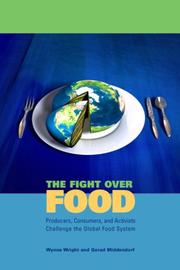
ISBN: 027103498X 9780271034980 9780271032740 027103274X 9780271032757 0271032758 Year: 2008 Publisher: University Park, Pa.: Pennsylvania state university press,
Abstract | Keywords | Export | Availability | Bookmark
 Loading...
Loading...Choose an application
- Reference Manager
- EndNote
- RefWorks (Direct export to RefWorks)
“One problem with the food system is that price is the bottom line rather than having the bottom line be land stewardship, an appreciation for the environmental and social value of small-scale family farms, or for organically grown produce.” —Interview with farmer in Skagit County, Washington For much of the later twentieth century, food has been abundant and convenient for most residents of advanced industrial societies. The luxury of taking the safety and dependability of food for granted pushed it to the back burner in the consciousness of many. Increasingly, however, this once taken-for-granted food system is coming under question on issues such as the humane treatment of animals, genetically engineered foods, and social and environmental justice. Many consumers are no longer content with buying into the mainstream, commodity-driven food market on which they once depended. Resistance has emerged in diverse forms, from protests at the opening of McDonald’s restaurants worldwide to ever-greater interest in alternatives, such as CSAs (community-supported agriculture), fair trade, and organic foods. The food system is increasingly becoming an arena of struggle that reflects larger changes in societal values and norms, as expectations are moving beyond the desire for affordable, convenient foods to a need for healthy and environmentally sound alternatives. In this book, leading scholars and scholar-activists provide case studies that illuminate the complexities and contradictions that surround the emergence of a “new day” in agriculture. The essays found in The Fight Over Food analyze and evaluate both the theoretical and historical contexts of the agrifood system and the ways in which trends of individual action and collective activity have led to an “accumulation of resistance” that greatly affects the mainstream market of food production. The overarching theme that integrates the case studies is the idea of human agency and the ways in which people purposefully and creatively generate new forms of action or resistance to facilitate social changes within the structure of predominant cultural norms. Together these studies examine whether these combined efforts will have the strength to create significant and enduring transformations in the food system.
Food supply --- Agriculture --- Sociology, Rural --- Food control --- Produce trade --- Food security --- Single cell proteins --- Social aspects. --- Social aspects --- Food supply - Social aspects --- Agriculture - Social aspects
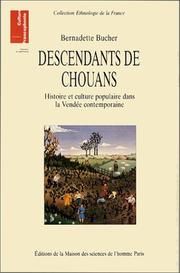
ISBN: 2735106446 9782735106448 2735117979 Year: 1995 Volume: 15 Publisher: Paris: Maison des sciences de l'homme,
Abstract | Keywords | Export | Availability | Bookmark
 Loading...
Loading...Choose an application
- Reference Manager
- EndNote
- RefWorks (Direct export to RefWorks)
Contrairement au mythe toujours vivace d’une paysannerie vendéenne passive et fidèle à un ancien régime catholique, féodal et monarchique, Bernadette Bucher nous plonge dans une histoire profonde jalonnée de ruptures, de rebellions populaires et renversements d’alliance à l’égard de l’Eglise, des seigneurs et du roi. L’importance du protestantisme sur la terre même des guerres de Vendée n’en est pas la moindre surprise. Pour l’auteur, la continuité entre cette Vendée mythique et la Vendée contemporaine résulte moins des idéologies politiques et religieuses que de la remarquable plasticité de la culture populaire bocaine dont l’ethnologue nous décrit les changements spectaculaires observés sur le terrain depuis quinze ans. Les particularités de l’économie domestique (coublage, salariés dits à mi-viage), l’étonnante vitalité des codes de conduite et des valeurs-charnières (vaillance, simplicité, économie), la richesse des rites de sociabilité (mariage, chasse à courre, caves des hommes) mettent en lumière une logique inattendue des transformations du monde rural. À l’heure où l’Europe cherche à se créer une identité supranationale, Descendants de Chouans nous invite ainsi à revoir le concept même de « communauté » à la lumière du modèle vendéen, et à redonner au quotidien le rôle qui leur revient dans les métamorphoses de l’Histoire.
Social change --- Agriculture --- History --- Social aspects --- Vendée (France) --- Social life and customs. --- The Vendée (France) --- Social change - France - Vendee - History - 20th century. --- Agriculture - Social aspects - France - Vendee. --- Sociology: customs & traditions --- Vendée --- paysannerie --- communauté --- Département de la Vendée (France) --- Vendée, le département (France)
Multi
ISBN: 9781400865512 9780691160399 Year: 2015 Publisher: Princeton, N.J. Princeton University Press
Abstract | Keywords | Export | Availability | Bookmark
 Loading...
Loading...Choose an application
- Reference Manager
- EndNote
- RefWorks (Direct export to RefWorks)
Most people in the world today think democracy and gender equality are good, and that violence and wealth inequality are bad. But most people who lived during the 10,000 years before the nineteenth century thought just the opposite. Drawing on archaeology, anthropology, biology, and history, Ian Morris explains why. Fundamental long-term changes in values, Morris argues, are driven by the most basic force of all: energy. Humans have found three main ways to get the energy they need--from foraging, farming, and fossil fuels. Each energy source sets strict limits on what kinds of societies can succeed, and each kind of society rewards specific values. But if our fossil-fuel world favors democratic, open societies, the ongoing revolution in energy capture means that our most cherished values are very likely to turn out not to be useful any more. Foragers, Farmers, and Fossil Fuels offers a compelling new argument about the evolution of human values, one that has far-reaching implications for how we understand the past--and for what might happen next. Originating as the Tanner Lectures delivered at Princeton University, the book includes challenging responses by classicist Richard Seaford, historian of China Jonathan Spence, philosopher Christine Korsgaard, and novelist Margaret Atwood.
Philosophy --- Social sciences (general) --- History --- Agriculture -- Social aspects -- History --- Civilization -- Forecasting --- Civilization -- History --- Fossil fuels -- Social aspects -- History --- Hunting and gathering societies -- History --- Power resources --Social aspects -- History --- Social change -- History --- Social evolution -- History --- Social values -- History --- Social values --- Social evolution --- Social change --- Power resources --- Hunting and gathering societies --- Agriculture --- Fossil fuels --- Civilization --- Social aspects --- Forecasting
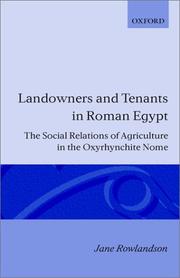
ISBN: 019814735X 0191589950 0585215146 9780191589959 9780198147350 1383004986 Year: 1996 Volume: *9 Publisher: Oxford : Clarendon press,
Abstract | Keywords | Export | Availability | Bookmark
 Loading...
Loading...Choose an application
- Reference Manager
- EndNote
- RefWorks (Direct export to RefWorks)
Oxyrynchus in Egypt is one of the best documented cities of the Roman Empire. This study draws upon the thousands of papyrus documents found there to examine how the city's landowning class derived wealth from the rural hinterland, and the relationship between landowner and farming tenant.
Agriculture --- Land tenure --- Propriété foncière --- Social aspects --- Aspect social --- Oxyrhynchus (Extinct city) --- Oxyrhynchos (Ville ancienne) --- Social conditions --- Conditions sociales --- -Land tenure --- -Agrarian tenure --- Feudal tenure --- Freehold --- Land ownership --- Land question --- Landownership --- Tenure of land --- Land use, Rural --- Real property --- Land, Nationalization of --- Landowners --- Serfdom --- Farming --- Husbandry --- Industrial arts --- Life sciences --- Food supply --- -Oxyrhynchite Nome (Egypt) --- -Social conditions --- -Social aspects --- -Land use, Rural --- Agrarian tenure --- Propriété foncière --- Oxyrhynchite Nome (Egypt) --- Scepter Nome (Egypt) --- Social conditions. --- E-books --- Business & Economics --- Real Estate, Housing & Land Use --- Egypt --- Oxyrhynchite Nome --- Land tenure - Egypt - Oxyrhynchite Nome. --- Agriculture - Social aspects - Egypt - Oxyrhynchite Nome. --- Oxyrhynchite Nome (Egypt) - Social conditions.
Book
ISBN: 2709906759 9782709906753 Year: 1983 Volume: 156 Publisher: Paris: ORSTOM,
Abstract | Keywords | Export | Availability | Bookmark
 Loading...
Loading...Choose an application
- Reference Manager
- EndNote
- RefWorks (Direct export to RefWorks)
Agriculture --- Senufo (African people) --- Dyula (African people) --- Social aspects --- (675.7) KINSHASA --- 30 SOCIOLOGY --- 301.185 FAMILY --- 631.5 CULTIVATION METHODS --- (666.8) IVORY COAST --- 312 DEMOGRAPHY --- 63 AGRICULTURE, FORESTRY --- 330 ECONOMICS --- Senefou (African people) --- Senoufo (African people) --- Siena (African people) --- Syena (African people) --- Ethnology --- Dabakala (African people) --- Dioula (African people) --- Diula (African people) --- Djula (African people) --- Dyoula (African people) --- Dyoura (African people) --- Dyulake (African people) --- Dyulanke (African people) --- Jula (African people) --- Juula (African people) --- Wangara (African people) --- Wankara (African people) --- Farming --- Husbandry --- Industrial arts --- Life sciences --- Food supply --- Land use, Rural --- Agriculture - Côte d'Ivoire - Karakpo Region (Boundiali) --- Agriculture - Social aspects - Côte d'Ivoire - Karakpo Region (Boundiali)
Book
ISBN: 9048129591 9048129613 9786612824890 9048129605 1282824899 9400791186 Year: 2010 Publisher: Dordrecht ; New York : Springer,
Abstract | Keywords | Export | Availability | Bookmark
 Loading...
Loading...Choose an application
- Reference Manager
- EndNote
- RefWorks (Direct export to RefWorks)
SOIL —beneath our feet —food and fiber —ashes to ashes, dust to dust —dirt Soil has been called the final frontier of environmental research. The critical role of soil in biogeochemical processes is tied to its properties and place—porous, structured, and spatially variable, it serves as a conduit, buffer, and transformer of water, solutes and gases. Yet what is complex, life-giving, and sacred to some, is ordinary, even ugly, to others. This is the enigma that is soil. Soil and Culture explores the perception of soil in ancient, traditional, and modern societies. It looks at the visual arts (painting, textiles, sculpture, architecture, film, comics and stamps), prose & poetry, religion, philosophy, anthropology, archaeology, wine production, health & diet, and disease & warfare. Soil and Culture explores high culture and popular culture—from the paintings of Hieronymus Bosch to the films of Steve McQueen. It looks at ancient societies and contemporary artists. Contributors from a variety of disciplines delve into the mind of Carl Jung and the bellies of soil eaters, and explore Chinese paintings, African mud cloths, Mayan rituals, Japanese films, French comic strips, and Russian poetry.
Agriculture --Social aspects. --- Soils in art. --- Soils --Social aspects. --- Agriculture --- Soils --- Soils in art --- Anthropology --- Earth & Environmental Sciences --- Social Sciences --- Agriculture - General --- Social & Cultural Anthropology --- Social aspects --- Soils in literature. --- Soils in motion pictures. --- Social aspects. --- Life sciences. --- Science. --- Earth sciences. --- Sedimentology. --- Agriculture. --- Soil science. --- Soil conservation. --- Life Sciences. --- Science, general. --- Soil Science & Conservation. --- Earth Sciences, general. --- Sociology, Rural --- Earth (Soils) --- Mold, Vegetable --- Mould, Vegetable --- Soil --- Vegetable mold --- Agricultural resources --- Plant growing media --- Regolith --- Land capability for agriculture --- Geography. --- Science, Humanities and Social Sciences, multidisciplinary. --- Cosmography --- Earth sciences --- World history --- Conservation of soil --- Erosion control, Soil --- Soil erosion --- Soil erosion control --- Agricultural conservation --- Soil management --- Petrology --- Farming --- Husbandry --- Industrial arts --- Life sciences --- Food supply --- Land use, Rural --- Control --- Prevention --- Conservation --- Geosciences --- Environmental sciences --- Physical sciences --- Pedology (Soil science)
Book

ISBN: 9781400865512 1400865514 9780691160399 0691160392 0691175896 1336028157 9780691175898 Year: 2015 Publisher: Princeton, NJ : Princeton University Press,
Abstract | Keywords | Export | Availability | Bookmark
 Loading...
Loading...Choose an application
- Reference Manager
- EndNote
- RefWorks (Direct export to RefWorks)
Most people in the world today think democracy and gender equality are good, and that violence and wealth inequality are bad. But most people who lived during the 10,000 years before the nineteenth century thought just the opposite. Drawing on archaeology, anthropology, biology, and history, Ian Morris explains why. Fundamental long-term changes in values, Morris argues, are driven by the most basic force of all: energy. Humans have found three main ways to get the energy they need-from foraging, farming, and fossil fuels. Each energy source sets strict limits on what kinds of societies can succeed, and each kind of society rewards specific values. But if our fossil-fuel world favors democratic, open societies, the ongoing revolution in energy capture means that our most cherished values are very likely to turn out not to be useful any more. Foragers, Farmers, and Fossil Fuels offers a compelling new argument about the evolution of human values, one that has far-reaching implications for how we understand the past-and for what might happen next. Originating as the Tanner Lectures delivered at Princeton University, the book includes challenging responses by classicist Richard Seaford, historian of China Jonathan Spence, philosopher Christine Korsgaard, and novelist Margaret Atwood.
Agriculture -- Social aspects -- History --- Civilization -- Forecasting --- Civilization -- History --- Fossil fuels -- Social aspects -- History --- Hunting and gathering societies -- History --- Power resources --Social aspects -- History --- Social change -- History --- Social evolution -- History --- Social values -- History --- Social values --- Social evolution --- Social change --- Power resources --- Hunting and gathering societies --- Agriculture --- Fossil fuels --- Civilization --- Anthropology --- Social Sciences --- Social & Cultural Anthropology --- Barbarism --- Civilisation --- Auxiliary sciences of history --- Culture --- World Decade for Cultural Development, 1988-1997 --- Farming --- Husbandry --- Industrial arts --- Life sciences --- Food supply --- Land use, Rural --- Cultural history --- Fossil energy --- Fuel --- Energy minerals --- Food gathering societies --- Gathering and hunting societies --- Hunter-gatherers --- Hunting, Primitive --- Ethnology --- Subsistence hunting --- Energy --- Energy resources --- Power supply --- Natural resources --- Energy harvesting --- Energy industries --- Cultural evolution --- Cultural transformation --- Culture, Evolution of --- Evolution --- Values --- History --- Social aspects --- Forecasting --- Forecasting. --- History.
Periodical
ISSN: 13706233 17804507 Publisher: Gembloux Faculté universitaire des sciences agronomiques
Abstract | Keywords | Export | Availability | Bookmark
 Loading...
Loading...Choose an application
- Reference Manager
- EndNote
- RefWorks (Direct export to RefWorks)
A journal covering the fields of crop and animal productions and sciences, forest sciences, soil and earth sciences, rural engineering, environment, bioindustries, food technologies, economy and sociology. 1 vol. (4 issues) / year ; http://www.bib.fsagx.ac.be/base/ ; E-mail : BASE @ fsagx.ac.be
Agronomy --- Human ecology. Social biology --- Biotechnology --- Agriculture --- Environnement --- Landbouw --- Milieu --- Périodiques --- Tijdschriften --- Agricultural biotechnology --- Biotechnologie agricole --- Social aspects --- Periodicals --- Environmental aspects --- Aspect social --- Aspect de l'environnement --- agriculture --- #TS:WDEP --- #TS:WBIB --- 63 --- 66.098 --- Agriculture and related sciences and techniques. Forestry. Farming. Wildlife exploitation --- Biological processes. Biotechnology --- Agriculture Sciences --- Crops, Crop Production and Protection --- General and Others --- Engineering --- Environmental Sciences --- Life Sciences --- Belgium --- Gembloux --- agronomy --- biotechnology --- crop production --- current periodical --- earth sciences --- environment --- forestry --- quarterly --- research institutes --- rural development --- sociology --- universities --- 66.098 Biological processes. Biotechnology --- 63 Agriculture and related sciences and techniques. Forestry. Farming. Wildlife exploitation --- Agriculture Sciences. --- Biotechnology. --- Engineering. --- Environmental Sciences. --- Life Sciences. --- Périodiques --- DOAJ-E EJAGRON EJBIOMO EJECOLO EPUB-ALPHA-B EPUB-PER-FT FUSAGX-E POPUPS-E --- earth science --- forestry --- agronomy --- rural engineering --- food technologies --- biotechnology --- Farming --- Husbandry --- Industrial arts --- Life sciences --- Food supply --- Land use, Rural --- Agro-biotechnology --- agriculture. --- Environmental protection. Environmental technology --- 63 Landbouw, veeteelt en verwante wetenschappen en technieken. Bosbouw. Landbouw. Exploitatie van dieren in het wild. --- Landbouw, veeteelt en verwante wetenschappen en technieken. Bosbouw. Landbouw. Exploitatie van dieren in het wild. --- Ecologie agricole --- Agronomie --- Écologie agricole. --- Écologie agricole. --- Agricultural biotechnology. --- Environmental aspects. --- Social aspects. --- Sociology, Rural --- Environmental protection --- Agricultural biotechnology - Periodicals --- Agriculture - Environmental aspects - Periodicals --- Agriculture - Social aspects - Periodicals --- Biotechnologie agricole - Périodiques --- Agriculture - Aspect de l'environnement - Périodiques --- Agriculture - Périodiques --- Agriculture. --- Biotechnologie agricole. --- Agronomie.
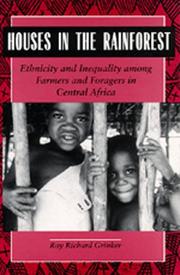
ISBN: 0520089758 0520083571 0520915666 0585129789 9780520915664 9780585129785 9780520089754 9780520083578 Year: 1994 Publisher: Berkeley (Calif.) : University of California press,
Abstract | Keywords | Export | Availability | Bookmark
 Loading...
Loading...Choose an application
- Reference Manager
- EndNote
- RefWorks (Direct export to RefWorks)
This is the first ethnographic study of the farmers and foragers of northeastern Zaire since Colin Turnbull's classic works of the 1960s. Roy Richard Grinker lived for nearly two years among the Lese farmers and their long-term partners, the Efe (Pygmies), learned their languages, and gained unique insights into their complex social relations and ethnic identities. By showing how political organization is structured by ethnic and gender relations in the Lese house, Grinker challenges previous views of the Lese and Efe and other farmer-forager societies, as well as the conventional anthropological boundary between domestic and political contexts.
Efe (African people) --- Hunting and gathering societies --- Lese (African people) --- Agriculture --- Hunting. --- Ethnic identity. --- Agriculture. --- Social aspects --- #SBIB:39A6 --- #SBIB:39A73 --- #SBIB:39A11 --- Etniciteit / Migratiebeleid en -problemen --- Etnografie: Afrika --- Antropologie : socio-politieke structuren en relaties --- History & Archaeology --- Regions & Countries - Africa --- Hunting --- Ethnic identity --- Ituri Forest (Congo) --- Ethnic relations. --- Efe (Peuple d'Afrique) --- Chasseurs-cueilleurs --- Lese (Peuple d'Afrique) --- Aspect social --- Identité ethnique --- Chasse --- Ituri, Forêt de l' (Zaïre) --- Relations interethniques --- Balese (African people) --- Balese (African tribe) --- Balissi (African people) --- Lesa (African people) --- Lesse (African people) --- Lissi (African people) --- Walese (African people) --- Walisi (African people) --- Ethnology --- Mamvu (African people) --- Food gathering societies --- Gathering and hunting societies --- Hunter-gatherers --- Hunting, Primitive --- Subsistence hunting --- Efeh (African people) --- Efet (African people) --- Mbuti (African people) --- Farming --- Husbandry --- Industrial arts --- Life sciences --- Food supply --- Land use, Rural --- Congo (Democratic Republic) --- Ituri Forest --- Ituri Forest (Zaire) --- Ethnic relations --- Efe (African people) - Hunting. --- Efe (African people) - Ethnic identity. --- Hunting and gathering societies - Congo (Democratic Republic) - Ituri Forest. --- Lese (African people) - Agriculture. --- Lese (African people) - Ethnic identity. --- Agriculture - Social aspects - Congo (Democratic Republic) - Ituri Forest. --- africa. --- agriculture. --- antropology. --- caste system. --- clan. --- economy. --- efe. --- etnicity. --- farmer forager. --- farmers. --- farming. --- foraging. --- gender. --- group hierarchies. --- house. --- household. --- ituri. --- kinship. --- lese. --- lineage. --- marriage. --- nonfiction. --- poverty. --- pygmies. --- rainforest. --- reciprocity. --- rural. --- underdeveloped countries. --- village. --- witchcraft. --- witches. --- wives. --- women. --- zaire.
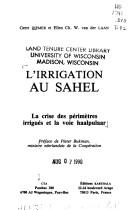
ISBN: 286537193X 9782865371938 Year: 1987 Publisher: Paris: Karthala,
Abstract | Keywords | Export | Availability | Bookmark
 Loading...
Loading...Choose an application
- Reference Manager
- EndNote
- RefWorks (Direct export to RefWorks)
Tukulor (African people) --- Agriculture --- Irrigation --- Social aspects --- Economic conditions --- Senegal --- Approvisionnement en eau --- water supply --- Développement rural --- Rural development --- Sociologie économique --- Economic sociology --- Culture irriguée --- Irrigated farming --- Périmètre irrigué --- Irrigation schemes --- Sahel --- Sénégal --- 631.67 <662> --- 316.334.55 --- Irrigation--Sahel --- Plattelandssociologie --- 316.334.55 Plattelandssociologie --- 631.67 <662> Irrigation--Sahel --- Futanke (African people) --- Futankobe (African people) --- Futankoobe (African people) --- Haal Pulaaren (African people) --- Haalpulaar (African people) --- Hal-Pularen (African people) --- Halpulaar (African people) --- Pulaar (African people) --- Takarir (African people) --- Tekarir (African people) --- Tekrouriens (African people) --- Tokolor (African people) --- Tokoror (African people) --- Tooroobe (African people) --- Torado (African people) --- Torodo (African people) --- Toucouler (African people) --- Toucouleur (African people) --- Toucouleurs --- Tuculeur (African people) --- Tukolor (African people) --- Tukuler (African people) --- Tukuleur (African people) --- Turkylor (African people) --- Ethnology --- Fula (African people) --- Water in agriculture --- Chemigation --- Farming --- Husbandry --- Industrial arts --- Life sciences --- Food supply --- Land use, Rural --- Agriculture&delete& --- Economic conditions. --- Senegal. --- Tukulor (African people) - Agriculture - Social aspects --- Tukulor (African people) - Economic conditions --- Agriculture - Senegal --- Irrigation - Senegal --- Senegal - Economic conditions --- Cta --- Vallee du senegal --- Culture traditionnelle
| Listing 1 - 10 of 11 | << page >> |
Sort by
|

 Search
Search Feedback
Feedback About UniCat
About UniCat  Help
Help News
News